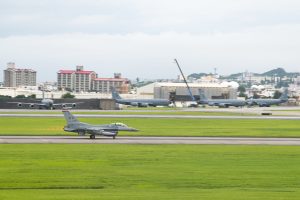Public anger is spreading in Japan’s southern prefecture of Okinawa after two new sexual assault cases allegedly committed by U.S. soldiers came to light in late June.
Okinawans are coming out in force in front of the U.S. Kadena Air Base, where one of the alleged assailants is being held in custody after being released on bail. Meanwhile, more than a few city and town assemblies in Okinawa have passed protest resolutions calling on the Japanese and U.S. governments to provide compensation to the victims and take effective measures to prevent recurrence.
Amid rising tensions with China over the Senkaku/Diaoyu Islands and the Taiwan Strait, Okinawa is a strategically important area for the Japan-U.S. alliance. It is located on the very front line vis-à-vis China, and 70 percent of the land in Japan that is exclusive to U.S. military facilities are concentrated there.
Unless an apology and compensation are given to the victims swiftly and measures to prevent future assaults are implemented promptly, the anti-U.S. military base sentiment and movement in Okinawa would grow, damaging Japan-U.S. cooperation at a crucial time.
The first sexual assault case occurred in December 2023. According to Japanese prosecutors, Brennon R. E. Washington, a 25-year-old member of the U.S. Air Force, is alleged to have approached a girl younger than 16 in a park in the central part of Okinawa’s main island on the night of December 24, 2023. Prosecutors say Washington forced the girl into his car and took her to his home outside Kadena Air Base, where he sexually assaulted her.
The Okinawa Prefectural Police, who received a report from the victim, investigated the case, and the Naha District Public Prosecutors Office indicted Washington on charges of indecent kidnapping and non-consensual sexual intercourse on March 27, 2024.
His trial is scheduled to open on July 12.
What is most surprising is that this incident was not made public until it was first reported by an Okinawan TV station on June 25. It took six months for the incident to come to light.
To make matters worse, the Okinawa Prefectural Government had no information about the incident during that time.
In 1997, the U.S.-Japan Joint Committee, comprised of foreign affairs and defense officials from both the Japanese and U.S. governments, agreed on standards for reporting incidents and accidents involving U.S. forces in Japan. The Ministry of Foreign Affairs has a channel for reporting contact from the U.S. side to the Ministry of Defense. Then, the Japanese government and the U.S. side are supposed to contact the prefecture through the Okinawa Defense Bureau. But they didn’t inform the Okinawan government at all in this incident.
On June 28, it also came to light via a media report in Okinawa that Jamel Clayton, a 21-year-old U.S. Marine lance corporal in the prefecture, was indicted on June 17 for attempted rape and injuring a woman in the village of Yomitan on May 26.
The Okinawa Prefectural Government was kept uninformed about this case as well until the media report.
In other words, two sexual crimes involving American service members in Okinawa, Japan’s politically and militarily sensitive island, which occurred in December and May, were only recently made public.
The Okinawa Prefectural Police defended their decision not to publicize the two cases of sexual violence allegedly perpetrated by U.S. soldiers based in Okinawa. The police explained, “We need to give sufficient consideration to preventing secondary victimization of the victims and protecting their privacy. We are also concerned that this could hinder the investigation.”
On July 2, Yomitan Village Mayor Ishimine Denjitsu visited the Foreign Ministry’s Okinawa office, where he urged the ministry to re-establish a system to promptly share information about incidents involving U.S. military personnel in the southwestern prefecture.
Ishimine stressed that such cases trample on women’s human rights and pointed out that if information was adequately shared, it could prevent similar cases from taking place.
These incidents have already shaken relations between the two countries. Japan lodged a protest at the United States Embassy in Tokyo over those two alleged sexual assault cases. On March 27, when Washington was indicted, Vice Minister for Foreign Affairs Okano Masataka asked U.S. Ambassador to Japan Rahm Emanuel to prevent a recurrence. Even then, the Japanese government did not pass on the details of the incident to the prefecture until June 25, when it came to light by media reports.
In the case of the U.S. Marine who was indicted on June 17, Okano also conveyed regret over the matter to Emanuel and called for stricter discipline and thorough measures to prevent a recurrence. But the Foreign Ministry did not pass on the information to the prefecture again. The government contacted the prefecture only on June 28, when the incident became known. Why?
As The Diplomat previously reported, it has been long said that Japan’s mainstream conservative political elites, bureaucrats, and politicians in Tokyo have “Ameriphobia” – a fear of the United States – that’s rooted in the devastation of the atomic bombs dropped on Hiroshima and Nagasaki. They are often criticized as being subservient to the United States in both military and diplomatic terms.
However, the Japanese public’s right to know must be protected at all times. The public, especially on Okinawa, must be informed that some U.S. soldiers are still committing such despicable acts. At the same time, this is not inconsistent with concealing the identity of the victims. Reporting is always necessary, and the privacy of the individual victims must always be protected at the same time.
In order to prevent the recurrence of such tragic human rights violations by U.S. soldiers, Japan should unite and resolutely stand up to the U.S. government and military to defend Japanese citizens.
































